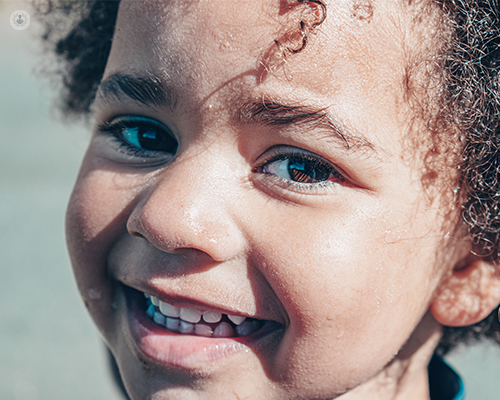Understanding hypopituitarism’s effect on your child’s health
Escrito por:Hypopituitarism (“hypo-” meaning “under”) happens when the pituitary gland is not active enough. While it can be difficult to diagnose, it’s incredibly important that people of all ages, particularly children, receive treatment to get their hormones back in balance.
Dr Helen Spoudeas is a leading UK paediatric endocrine subspecialist who has worked with children with hypopituitarism for many years. She provides you with a thorough guide so that you can understand what having hypopituitarism means for your child, as well as the life-long (and safe) treatment involved.

What is hypopituitarism?
To understand hypopituitarism, a form of hypothalamic dysfunction, I recommend that you quickly catch up on the basics of the hypothalamus. I explain what the hypothalamus is and its function in my other article: What happens to children’s growth when the hypothalamus isn’t functioning right?
Hypopituitarism (“hypo-” meaning “under”) happens when your pituitary gland is not active enough. As a result, the gland does not make enough pituitary hormones. There are eight hormones produced by the pituitary gland and hypopituitarism can result in the deficiency of one hormone, some hormones or all eight of these hormones. Usually, when the pituitary gland isn’t functioning at all and none of the eight hormones is being produced, we call it panhypopituitarism (“pan” meaning “all” in Greek).
If the pituitary gland is underactive in children, growth hormones in front of the gland tend to be affected first, which can affect puberty, development and also thyroid function. The most serious hormone to lack is the stress functioning hormone (cortisol) , which is usually the most resistant but the most life-threatening.
What’s the link between the hypothalamus and the pituitary gland?
The hypothalamus regulates the body’s endocrine system by sending hormones to the pituitary gland. The endocrine system is a variety of glands that secrete hormones all over the body so that it can perform a large range of functions.
At the beginning of my video looking at pituitary gland disorders and their treatment, I provide a detailed but comprehensive explanation on how the pituitary gland works using diagrams.
The pituitary gland consists of the anterior pituitary and the posterior pituitary. The hypothalamus and pituitary gland are connected by the pituitary stock, which allows hormones from the hypothalamus to be sent to the posterior pituitary, which will release the hormones into the bloodstream.
When looking for hormone dysfunction in the pituitary gland, we need to ask ourselves in which area is the deficiency happening – the posterior pituitary or anterior pituitary. The importance of differentiation is because it can help us understand which hormones are affected. For example, the posterior pituitary gland is linked to the hypothalamic part above it and a deficiency can result in classic problems like diabetes insipidus, which is a life-threatening deficiency of the hormone that helps retains water. It is the most serious of the deficiencies from the posterior pituitary.
What are the signs of hypopituitarism in children?
There are several symptoms of hypopituitarism in children. Some of these symptoms can take a long time to become apparent, while other symptoms can overlap with other disorders.
- Growth failure and delayed puberty
- Tiredness and stress due to an absence of the stress or thyroid hormones
- Unexplained and intense emotions e.g. extreme laughter or crying
- Learning difficulties
- Sleeping problems
- Unexplained obesity
- Diabetes insipidus (an excessive drive to drink water and excessively urinate)
What’s can cause hypopituitarism in children?
Several factors could cause the pituitary gland to become underactive in children e.g. a pituitary tumour, a lump, a genetic condition or maldevelopment (when a child’s brain hasn’t grown in the “normal” way).
Traumatic head injuries can also be a cause. We’ve found hormone dysfunction in some children who are going through rehabilitation after a serious traffic accident. A severe head injury can damage the pituitary stalk (which links the hypothalamus and pituitary gland) which is an even more vulnerable part of the brain. Severe whiplash and particularly having been chocked unconscious are two ways of causing damage to this vulnerable stalk.
Is hypopituitarism treatable?
Hypopituitarism is treatable. It’s incredibly important to diagnose, but there is often a delay in diagnosis due to the strangeness of symptoms e.g. a baby’s consistent laughter might be mistaken for a bit of reflux or chocking. However, to the trained eye, strange symptoms like this are a sign that the hypothalamus and pituitary gland function need to be evaluated.
Treating hypopituitarism begins with trying to understand the cause. For example, if you have a tumour that’s affecting the pituitary gland, we need to know how big it is, how to treat it and how to prevent further dysfunction. After this, we can get the pituitary gland working again.
How is hypopituitarism treated?
To recap, hypopituitarism means your pituitary gland isn’t active enough. This means that a child isn’t getting enough of one, several or all of the eight hormones produced by the pituitary gland. Therefore, we need to restore balance in the hormone(s) the child is missing to treat the hypopituitarism. At the end of the day, the most important form of treatment is hormone replacement therapy.
As we implement hormone replacement therapy, associated problems with the hypopituitarism become easier to manage e.g. learning and memory problems can be improved as well as sleeping difficulties. Some issues, such as weight problems, might become easier to treat, but can still be difficult.
How long will my child need to be on medication?
When hypopituitarism occurs, it’s usually permanent and lifelong. There is no cure, only treatment. Even if the cause is a tumour or lump which is removed or prevented from growing bigger, hormone deficiencies can still continue. Hormones must be in balance and we aim to restore this balance for as long as necessary, which generally means life-long treatment.
Can hypopituitarism treatment be dangerous?
Hormone replacement therapy for hypopituitarism is safe as long as patients take it at the advised dose. There should be no side-effects, therefore restoring normality to the child’s life. We (medical specialists) work out a dose to deliver that is as near to nature’s way as possible. It does require patience: working out how to make the hormones distribute naturally is a 24-hour task. It involves a management timetable of several medications and daily and emergency protocols.
Once we get over this challenge of figuring out the right dose of the deficient hormone(s), we can then begin to manage the secondary problems (e.g. obesity, learning difficulties etc.)
What specialists are involved in treating hypopituitarism?
Often, managing a true hypothalamic problem in a child, such as hypopituitarism, requires many different specialists to create a treatment plan.
- An endocrinologist
- A neurological specialist
- An ophthalmologist (eye surgeon) if vision is affected
- An oncologist (if a tumour is present)
More research, particularly on psychiatric and psychological neuro-disability and support, is needed. Hormones are just one aspect. However, we are consistently learning more about the hypothalamus and hypopituitarism.
Are you concerned about your child’s hormonal development and growth? Learn how Dr Spoudeas can help you care for your child’s health - visit her profile.


